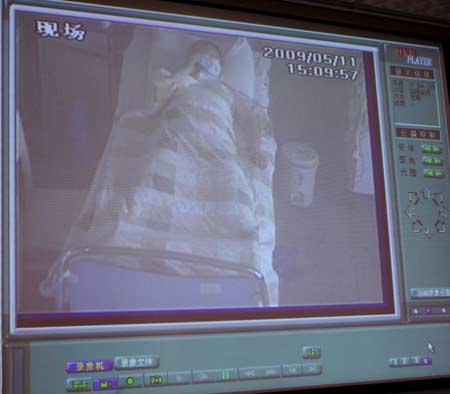I found this story on an Indian newspaper based out of Mumbai, DNA (Daily News and Analysis) on how the GDP of China, as announced by the country is
and the actual GDP is much lower. They have quoted Albert Edwards, chief global strategist, Societe Generale and International Energy Agency (IEA) to come to such a conclusion. Here is the full exerpt on the story
Venkatesan Vembu / DNA
Hong Kong: Cynical crunchers of statistical data believe there are three degrees of ‘mistruths’: lies, damned lies and statistics.
Increasingly, economy watchers are beginning to believe falsehood could go a step beyond: China’s GDP numbers. Ever since the official Chinese statistical agency announced earlier this year that the country’s GDP grew 6.1% in the first quarter of 2009, there have been murmurs of scepticism about the authenticity of those figures. A few have observed that the GDP data are inconsistent with other data, such as weak power production.
Those murmurs have in recent weeks turned into a high-decibel chorus that is beginning to openly rubbish the validity of the official numbers.
“The Q1 6.1% GDP outturn is simply a lie,” notes Albert Edwards, chief global strategist, Societe Generale. “It helps explain why the Chinese data is derided by so many economic commentators.”
Commodity prices worldwide have surged in recent weeks on the hopes of a robust V-shaped revival in the Chinese economy. But Edwards, who had rightly called the Malaysian economic crisis of 1997 and the dotcom bust of 2000, believes that “to the extent that the renewed surge in commodities and the metals and mining sectors are based on the Chinese growth miracle, the markets are relying on a combination of hype, lies and wishful thinking.”
Edwards isn’t alone in questioning the validity of the official data. Last month, the International Energy Agency (IEA) observed that China’s first-quarter GDP data “does not tally with oil demand data, which contracted by 3.5% year on year.” One explanation for this, IEA analysts reasoned, “is simply that real GDP data are not accurate, and therefore should not be taken at face value.”
Simultaneously, analysts at Lombard Street Research, a London-based economic consultancy, too argued that the 6.1% GDP growth figure was inconsistent with the 20% decline in trade volumes over the same period, because it would have required domestic demand to expand by 9% in real terms. Using official nominal annual growth rates for GDP and consumption for the first quarter, and consumer and fixed investment price indices as deflators for consumer spending and investment, respectively, Lombard analysts claimed that domestic demand expanded at most by 2% year on year in real terms.
They therefore concluded that real GDP growth in the first quarter was probably slightly negative or nil at best, and even in the fourth quarter of 2008, real growth was likely negative or flat. “If so, the last two quarters would effectively signal, from a Chinese perspective, a recession of a rare magnitude.”
China’s official statistical agency, the National Bureau of Statistics, responded to IEA’s scepticism with a stern rap on the knuckles. “It is regrettable that the point of view in the… article is groundless,” a notice on its website said.
“We believe that, for an international organisation, this approach lacks seriousness.””
Even economists who point to anecdotal evidence of China’s recovery concede that interpreting official Chinese data is problematic.
“Trying to understand China’s GDP data is always a nightmare for professional China economists,” observes Credit Suisse chief regional economist Dong Tao. “Since I joined this industry 14 years ago, I’ve had this trouble, I still have this trouble, and I suspect I will continue to have this trouble.”
He points out that there is abundant anecdotal evidence of a “phenomenal improvement” in China’s economy over the previous quarter too. “Go to restaurants, talk to real estate agents, count the number of shipping containers at terminals, see the number of cars being sold… I believe in my eyes.”
The plain-speaking Edwards, however, argues that “if the bubble of belief in China’s medium-term growth prospects finally bursts, it will have huge investment implications.”
It is all too easy, he reckons, for investors to buy into “beguiling growth stories, which are in fact utter nonsense.” He concedes that China’s mammoth 4 trillion yuan stimulus has had a beneficial effect on economic activity this year, but says that he still questions the “quaint notion the markets now seem to have that the Chinese economy can grow at a respectable rate when the rest of the world is in a deep recession.”
The “bullish group think on China is just as vulnerable to massive disappointment as any other extreme of bubble nonsense I have seen over the last two decades,” says Edwards. “The fall to earth will be equally shocking.”



 Events of the last week in Iran have been widely reported by the world press. Not long before, the press also reported on the 20th anniversary of the Tiananmen Square incident of 1989. Were these two distinct events reported in a similar manner or were they treated as different and unique events? Let’s take a look at each and see what we can find.
Events of the last week in Iran have been widely reported by the world press. Not long before, the press also reported on the 20th anniversary of the Tiananmen Square incident of 1989. Were these two distinct events reported in a similar manner or were they treated as different and unique events? Let’s take a look at each and see what we can find.

 Named after
Named after
Recent Comments